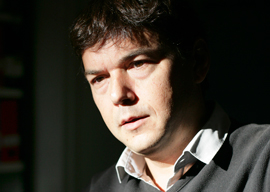
June 18, 2014

Thomas Piketty
The lack of panache in Piketty’s prose is especially noticeable when Capital in the Twenty-First Century is compared to the more amusing books of another heterodox economist, Cambridge’s Ha-Joon Chang, author of 23 Things They Don”t Tell You about Capitalism and Kicking Away the Ladder. The genial yet waspish Chang, the son of a South Korean finance ministry official, has modeled his persona on the suave Canadian economist John Kenneth Galbraith, who exchanged so many witticisms at Gstaad dinner parties with his frenemy William F. Buckley.
Like Galbraith (or Pat Buchanan), Chang enjoys pointing out that most rich countries didn”t get rich by following the dogmas of laissez-faire economics. Chang is, not unreasonably, proud of his civil servant father’s contribution in helping to build South Korea’s economy on what I might call “national capitalist” principles. South Korea would appear to have achieved a reasonable balance of growth and equality, but that potential role model for the West is not mentioned in the index of Piketty’s book.
Key policies of broadly successful economies typically include tariffs and immigration restriction. But Piketty won”t consider learning any lessons from East Asia. On page one of his book he declares that his policy recommendation”some kind of European or perhaps global superstate that hunts down and taxes all wealth (but don”t worry, Piketty’s will be a democratic empire)”is aimed at “avoiding protectionist and nationalist reactions.”
Yet Chang has noted that if Swedish bus drivers get paid, say, 50 times more than Indian bus drivers, it’s not because the Swedes are 50 times more productive at driving buses. It’s because the government of Sweden would use physical force to stop enough Indians from moving to Sweden to equalize wages. Chang observes:
“Our story of bus drivers reveals the existence of the proverbial elephant in the room. It shows that the living standards of the huge majority of people in rich countries critically depend on the existence of the most draconian control over their labor markets”immigration control. Despite this, immigration control is invisible to many …”
Piketty is one of the oblivious. Immigration is barely mentioned in his massive tome. When Piketty finally gets around to discussing immigration on p. 538-539, his analysis is romantic at best:
“Immigration is the mortar that holds the United States together, the stabilizing force that prevents accumulated capital from acquiring the importance it has in Europe …”
Piketty doesn”t seem to be aware that American plutocrats, both in the robber baron era and today, have overwhelmingly put their money on the side of more immigration. Billionaires who have donated toward more immigration include Gates, Zuckerberg, Charles and David Koch, Michael Bloomberg, Sheldon Adelson, George Soros, and Rupert Murdoch.
And that representative oversight helps explain why Piketty’s prose isn”t as fun to read as Chang’s: he simply isn”t as perceptive.